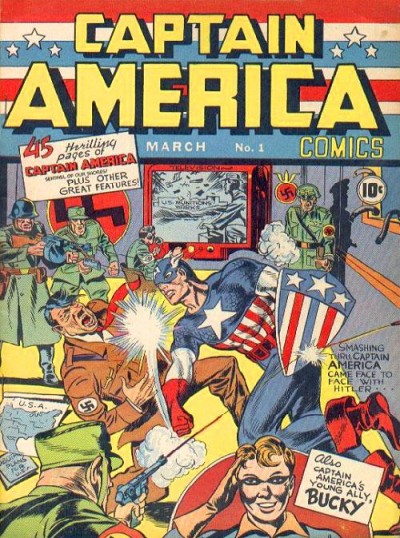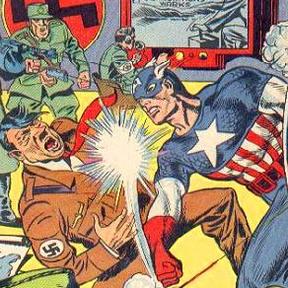
In Matthew Vaughn’s 2011 movie X-Men: First Class, Professor Charles Xavier tries to stop his friend Magneto—controller of all things metal—from killing American and Soviet navy servicemen during the height of the Cuban Missile Crisis by telling him the sailors were just “following orders.” Magneto then delivers arguably the best line of the film: “I’ve been at the mercy of men just following orders…never again.” The significance of this retort is apparent to anyone familiar with Magneto’s dark past: He was a German Jew and Holocaust survivor known as Max Eisenhardt or Erik Lensherr. His survival against the Third Reich’s Final Solution would cause him to be a champion of mutant rights, and we see him clash with humans—whom he considers inferior—on multiple occasions in the comic books and movie adaptations. He even has a brief stint as a Simon Wiesenthal-esque Nazi hunter in First Class (the sci-fi element and his search for a former concentration camp doctor element likens this part of his life to Ira Levin’s novel The Boys From Brazil). His mindset of mutant superiority, however, blurs his “noble” intentions (not to mention the lines of morality), and likens his ideologies to those of Hitler’s pseudo-sciences like eugenics, which he used to deem Jews and other groups inferior to the Aryan race. Magneto sadly lost his way; as a double pariah—both Jew and mutant—he lost complete faith in humanity and set out on a destructive path that made him no better than the evil men who made his life hell.
So why is this important? Why does it matter that Magneto is a Jew who stands up to intolerance? It’s because he—like many other comic book characters—is meant as a representation of all Jews, or, to paraphrase Commissioner Gordon, he is not the hero we deserve, but the one we desperately need. An event like the Holocaust raises more questions than we can answer: “Why was it allowed to happen?” “Why didn’t more people stand up to the Nazi death machine?” “If the Americans knew about the death camps, why not make more of an effort to bomb the train tracks to prevent Jews and so many others from being carried to their dooms?” These queries could drive a person (especially a survivor) mad; indeed, after WWII, many lost or renounced their faith and assimilated. For others, however, the queries gave them a better appreciation for life, instilling an even deeper affection for their freedom and their families. Whatever happened, the Holocaust can never be rationalized and remains burned in the collective Jewish memory forever like a string of numbers tattooed on an arm.
As Simcha Weinstein points out in his book Up, Up, and Oy Vey!, comic books were a way for American Jews of immigrant parents to live out their desire for a double life: having one secret identity as a Jew and one public identity as an American allowed them to escape the second-class status society ascribed to them.
In other words, comic books were a way to fight back, to kick intolerance in its big round tuchus. While it was only wishful thinking, it allowed us—in a small way—to deal with being picked on by the big kid nations and empires ever since becoming a nation ourselves way back when. Almost every famous superhero was created by American Jews: Captain America (Jack Kirby and Joe Simon), Batman (Bob Kane and Bill Finger), Superman (Jerry Siegel and Joe Shuster), and the X-Men (Stan Lee and Jack Kirby). Even Ben Grimm from The Fantastic Four is a Jew who grew up on the Lower East Side of New York City. If you look at Captain America Comics #1 (1941), you’ll see Steve Rodgers socking ol’ Adolf in the jaw.
In third part of the Superman Time and Time Again series (1991), the Man of Steel is sent back in time to prevent the Nazis from getting the atomic bomb and free a transport of Jews from a cattle car. In this way, comic book creators can change history for the better with a popular comic book device known as retroactive continuity (‘retcon’ for short), which allows one to alter a story in order to fix chronological errors or tell your own take on the tale without screwing up what came before. It’s popular in the DC and Marvel universes and last year, Bryan Singer’s X-Men Days of Future Past retconned the outcome of the original trilogy.
Exploring the themes of hate, injustice, and evil in something as innocuous as a comic book can be seen as cathartic for the Jewish people. It allows us to play out our innermost desires—our need to be resilient and oppose the bad guy—in a fun and safe environment. Works like Art Spiegelman’s Maus take a more mature look at the world and force us to confront our nightmares. I say that comic books and their characters keep us sane because we need someone who can rip through Hitler, Goebbels, and Heydrich without breaking a sweat, who can punish them for making us suffer. We need someone like Magneto who—while a little meshugeh—knows to never let history repeat itself.
With Yom HaShoah today, it is important to keep in mind two of the most important words in the English language “Never Again.” If you’ve ever read Philip K. Dick’s The Man in the High Castle or C.J. Sansom’s Dominion, you’ll know just how scary the world could have been if the Nazis had gotten their way. The pervasive lies and dwindling pool of survivors make it imperative for us to keep the memory of the Holocaust alive. Because Captain America never actually liberated a concentration camp and Magneto never sought retribution for what was done to him, we must look to these characters and their stories as inspiration to become the heroes the world so desperately needs.
Josh Weiss is a student at Drexel University.

